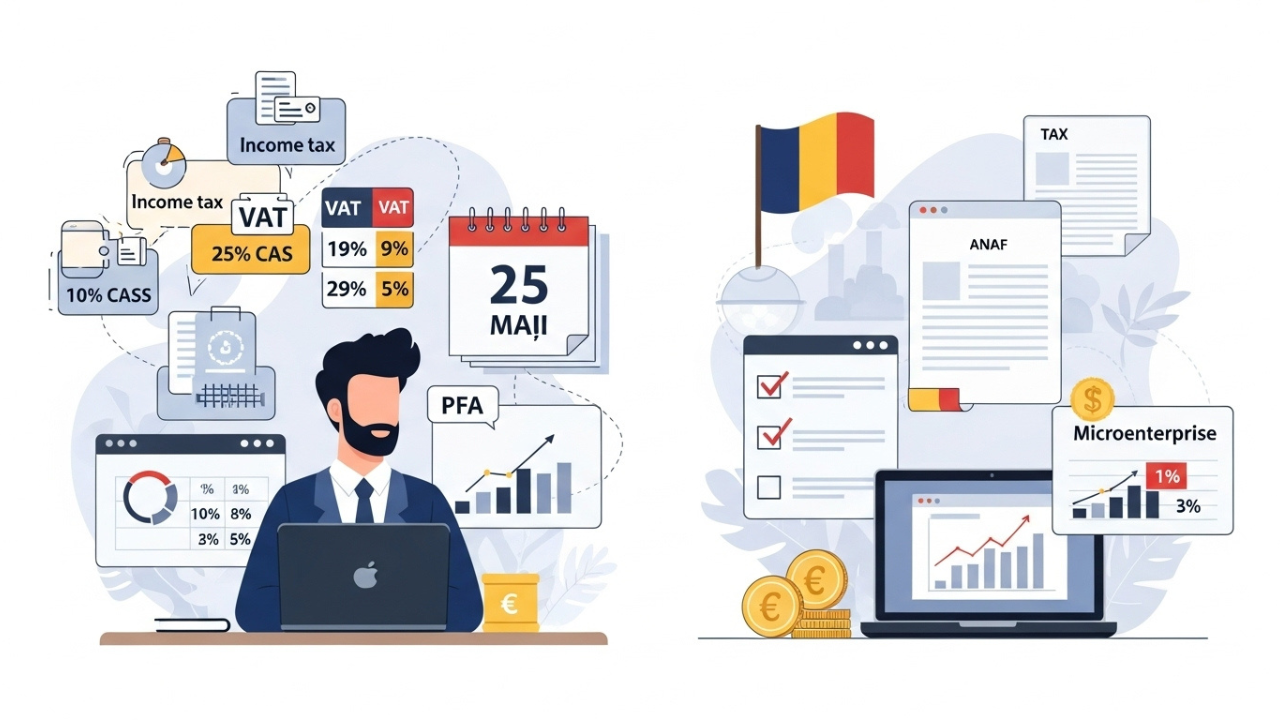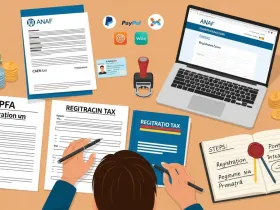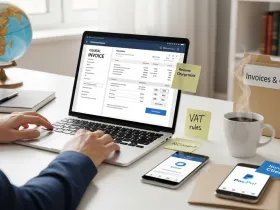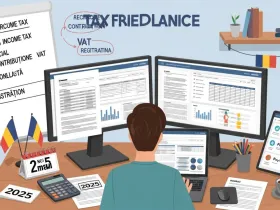Planning to start freelance work in Romania by the year 2025? Knowing your taxes will help you with financial efficiency and make sure you stay compliant with the law. This article offers detailed information about Romania’s freelancing tax system that will be beneficial to you.
Key Takeaways
- Romanian freelancers pay a 10% tax on their income.
- Health insurance and pensions are mandatory health contributions and are charged at 10% (CASS) and 25% (CAS) respectively.
- Freelancers can register for VAT provided their annual income exceeds 300,000 RON, below this it is optional.
- Taxes must be settled by the 25th of May for the previous year.
- A microenterprise regime is set for small companies that need simplified taxation, and there are some other rules based on employee numbers and turnover.
Understanding Romania’s Tax System for Freelancers
Getting taxable income for each freelancer in Romania comes along with a set of rules. It includes but isn’t limited to the following;
1. Income Tax
B Post-secondary Taxation With respect to freelancers, Romania’s flat rate percentage is 10%. This indicates that every single romania freelancer tax payer falls under the same taxation category regardless of their income level. It is important to determine your taxable income to make accurate calculations on how much tax to pay.
2. Social Contributions
Freelancer’s social contributions are as follows:
-
Pension Contribution (CAS): 25% of your taxable income.
-
Health Insurance Contribution (CASS): 10% of your taxable income.
These contributions are obligatory, and the freelancer must pay them based on the income he has declared.
3. VAT Registration and Rates
-
VAT Registration Threshold: A legal entity is obliged to register for VAT if its annual income exceeds 300,000 RON. This registration allows the legal entity to charge VAT on his services and also reclaim VAT paid on the expenses incurred in the course of business.
-
VAT Rates:
-
Standard Rate: 19%
-
Reduced Rates: 9% and 5% for specific goods and services.
-
Identifying the applicable rate for your services is important to avoid inaccuracies in invoicing.
Tax Return Filing and Deadlines
1. Annual Tax Return
An annual tax return must be filed with the Romanian tax authorities (ANAF) by all the freelancers. The aim of this return is to summarize the revenue and expenditure and calculate the tax to be paid.
2. Filing Deadline
The annual tax return has to be submitted together with payment by May 25th of the year following the reporting year. In other words, for remuneration received during the year 2025, the tax return will be submitted by the 25th of May 2026.
3. Payment of Taxes
Along with the submission of your tax return, any taxes owed must be paid by the same deadline. Payments can be made through the Virtual Private Space or via the online platform ghișeul.
Microenterprise Tax Regime in Romania (2025)
If you work on a freelance basis in Romania, and your business is beginning to expand, you’re probably thinking about how to efficiently administrate your taxes. This is precisely how the microenterprise tax regime comes into play. It’s one of the simpler tax arrangements made for small companies and independent entrepreneurs. You may think of it as a more straightforward structure that can potentially help you save money—if you meet the criteria.
As for the microenterprise regime in 2025, you have three important criteria to fulfill. First, your annual turnover has to remain below €250,000. If you exceed this limit, you will be moved to a standard corporate income tax system. You must also have at least one employee with a written contract.
This means that an employee is not someone you simply pay, but someone you need to register with social contributions for. Lastly, at least 80% of your total revenue must come from providing services not classified as consulting or management. Therefore, if you’re mostly involved in strategic or advisory work, it’s highly likely you do not qualify for this regime.
In simpler terms, let’s talk about how these policies affect taxes. From all the criteria listed above, if you do manage to tick all the boxes, then your tax rate decreases quite significantly. Freelancers with at least one employee only pay 1% of their income in taxes, which is incredibly low. If you do not hire anyone, the rate becomes 3% of your income. Note that this amount is based on the gross income rather than the profit made. Therefore, having high expenses means you would still owe tax on the total amount earned, which is worth considering when measuring this option against the standard tax regime.
This can be very beneficial to a lot of freelancers who start getting consistent earnings from offering services such as designing, writing, developing, and even digital marketing. Despite the appealing features, responsibilities also come with this regime—in particular, if you’ve never hired an employee before.
Deductible Expenses for Freelancers
Regardless of whether you decide to work under the PFA (Authorized Natural Person) designation or as a microenterprise, knowing your deductible expenses is crucial and essential. Deductions of this nature help lower the amount of income you can get taxed on, which means less money owed.
To begin with, all office supplies and equipment that pertain to your freelance work can be written off. This additional expense may include computers, software, printers, and chairs designed for maximum comfort if the desk is one’s favorite spending place.
When working from home, you can claim a portion of your rent or mortgage, electricity, heating, and even your internet bill as part of your home office expenses. If you determine what portion of your house is used exclusively for business purposes, you can apply that ratio to your expenses.
Self-employed individuals who travel for business can also deduct travel-related expenses. This includes train and bus tickets, accommodation expenses during work trips, and business-related meals important for sustaining your work engagements.
Professional services is another great example that is frequently overlooked. Any professional fees like an accountant that sets up and files your annual return, or a lawyer that reviews your contracts, are tax-deductible. Even expenses for business coaching or consulting are eligible provided they have a focus on fostering the growth of your business.
Tracking all expenses having invoices, receipts, and payment confirmations is very important. In case of an audit by ANAF, you need to substantiate each deduction you make with evidence that the expense claimed was directly tied to your freelance business.
Navigating Tax Changes in 2025
One of the most concerning issues for a freelancer is the advancement of multifaceted taxation systems. Romania does have a more or less flat and predictable system but does have some evolution. For 2025, there are two changes which should be of concern to you, especially if you haven’t planned any strategies beforehand.
The first one is a higher rate on dividend distribution tax. Effective January 1, 2025, the rate will increase from 8 to 10 percent. While this may look like a small increment, it can quickly escalate if you are withdrawing a significant sum of profits from a company. If you intended to issue dividends, doing so prior to 2025 would have spared you some cash. With the new rate in effect, it is something which you will just have to incorporate into your planning year after year.
The construction tax, which is 1 percent, has been added as a new tax. It will impact your business if you own commercial office spaces. These assets will be valued on December 31, 2024, and the tax will be paid in two installments during 2025. If you do not hold any relevant assets, there is no concern; for those who do, however, needs to be planned for in their financial forecasts.
In isolation, these changes may seem inconsequential, but cumulatively, they can economically impact your bottom line. Adapting to these changes is simply one more responsibility for the freelancer or business owner.
Tips for Efficient Tax Management
After learning about the pertinent taxes and deductions, it is time to discuss strategies. Taxes are something that should be done with due diligence, but for maximum savings, efficiency, and peace of mind. Spending less time on managing taxes allows one to focus on their passions.
Staying organized year round is one of the easiest ways to improve record keeping. Preparing for tax season does not have to mean gathering receipts and invoices. You can set aside one hour on a weekly basis to record payments received, expenses made, and contracts signed. Keep everything organized using a spreadsheet or accounting software such as QuickBooks or Wave.
If you’re not well versed with the Romanian tax system, it is always best to work with an accountant or tax advisor who specializes in the field. Selecting PFA or microenterprise routes can be confusing without the help of an expert, but rest assured an advisor will ensure you receive the maximum relief possible through deductions. An accountant can help you reach financial improvement far beyond their service fee.
Equally important is to follow the adjustments as they happen. Tax rules do change, and most of the time, they will do so effortlessly. Follow ANAF updates, subscribe to their newsletters, or join online freelancer forums where alterations are talked about. Informed individuals avoid last-minute surprises and penalties which helps a lot.
Also, consider wishing your fingers into being a magician and waiting until the deadline when someone earns. A better plan is to set funds aside for taxes while earning money. Open a separate account and set bonuses that come with work payments. This way when May 25 comes around, tax payments can be made without a frantic search for funds.
My Opinion
Understanding the tax obligations freelancers need to fulfill allows them to plan as early as 2025 to comply with them in Romania. Sticking to the outlined tax rates, filing deadlines and regimes allows for smoother navigation of the tax systems.















Leave a Reply
View Comments